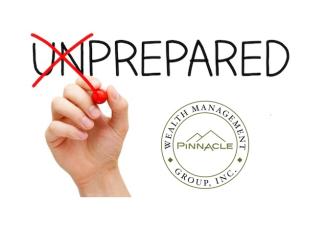
Estate Planning Review
Written By: Daniel A. Cesta, CPA, CFP®, MST
As you gather your 1099s and other tax documents in preparation for April 15th, now is also a good time to conduct a productive estate planning review. As has often been said, the only real constant in life is change. After all, markets change, tax rules change, and more importantly, your personal situation may change as well. But change can be good as each new year presents new challenges and new opportunities. With that in mind, let’s begin…
Wealth Management Topic: Why is estate planning important?
Maybe you think your estate isn’t that large or that you’re young, and therefore, don’t need to do estate planning. You couldn’t be more wrong. Estate planning involves much more than just reducing estate taxes or avoiding probate at your death. In a nutshell, planning gives you control. You are making certain that what you have, goes to whom you want, when and how you want it. It also allows you to set forth health care and guardianship directives and avoid conservatorship proceedings in the event of legal incapacity. For your heirs, it allows you to protect them should they become disabled, get divorced or sued, among other things. Below, I’ve listed some common mistakes that can be financially costly (but easy to correct):
- Naming children as joint owners on your bank accounts or home. (People do this to avoid probate but they do not realize the legal, financial, and relational ramifications of these actions.)
- Naming your estate as beneficiary of your IRA, causing them to be liquidated at your death instead of rolled over and “stretched-out” over the lives of your beneficiaries.
- Naming minor children as beneficiaries of your IRA.
- Owning assets in a sole person’s name and then having to pay expensive court costs to get access to those assets should the person become disabled or die.
- Not properly funding your revocable living trust(s).
- Improper ownership of life insurance causing the death benefit proceeds to be included in your estate.
Wealth Management – Are you protected?
As planners, one of the questions we ask clients during an estate planning review is: how will you and your families pay for potential nursing home expenses should the need arise?
Here are some of the facts:
- Americans are living longer and healthier lives.
- One out of three persons age 65-75 and nearly two out of three persons age 75-85 will spend some time in a nursing home.
- Eighty percent of persons, age 80 and older, will spend some time in a nursing home.
- According to a Genworth April 2016 Cost of Care Survey, conducted by CareScout®, of Nursing Home and Assisted Living Costs, the national median of a private bed in a nursing home facility is $250 per day, which computes to over $92,000 per year. For those patients who are in a semi-private room, the average cost is $225 per day, or about $82,000 annually. For a one bedroom, private, 12 months of care in an Assisted Living Facility the cost is over $43,000 annually.
- Medicare pays for only 2%-3% of all nursing home expenses.
- Medicaid pays for approximately 46% of nursing home expenses.
- Individuals and family members pay for about 51% of nursing home expenses.
From the above facts, it is evident that most of these expenses are borne by either Medicaid (for those who can prove a financial need) or privately (by individuals).
Wealth Management – How can we help?
As a wealth management team, we are always expounding the importance of not only having an estate plan, but also making sure that the plan is up to date. Below are some basic steps you should take to conduct a productive estate planning review. At Pinnacle Wealth Management Group, Inc., we work through all these steps with our clients to help ensure that items don’t get missed.
Step 1: Obtain/Create a Current Balance Sheet
- Before any estate planning can be done, you need to obtain an accurate inventory of all assets, liabilities, and their market values. Assets include any cash/savings you may have at banks, your personal residence and any additional vacation homes, rental properties, investment accounts, IRAs/401(k) plans etc., any family owned businesses, as well as, personal property. Essentially, if you own it, write it down on your balance sheet. Don’t forget to put down the cash value and death benefit values of any permanent life insurance you own, including any loans. From your list of assets, subtract any mortgages or other debts that you have to arrive at your net worth. By knowing your net worth, we can now begin to determine if you have an estate tax issue or whether your existing planning is still adequate, given your updated net worth figures.
Step 2: Review the Titling of Assets and Beneficiary Designations
- Once you have completed your balance sheet it is important to classify your assets by how they are titled (i.e. determining the form of ownership for each asset). You can actually complete this step while you are preparing your balance sheet by adding different columns for ownership. For example, place all jointly-held assets in one column and add additional columns for assets held individually by husband and/or wife. All titling decisions should be made within the context of a client’s estate planning needs and should also be reviewed periodically to ensure that they are still appropriate and consistent with any estate planning that is already in place. Also, it is important to note that laws differ from state to state, especially if you live in a community property state versus a common law state.
- It is also just as important to review all beneficiary designations on your retirement accounts, annuities, and life insurance contracts. Knowing who is going to inherit an asset and what affects that may have on your estate is very important. Also, without proper monitoring of your beneficiaries, the potential to make distributions to unintended people is quite possible. For example, would you like an ex-spouse to receive your lifelong retirement savings or your life insurance death benefits? Remember, whoever is named on your beneficiary form is entitled to receive those assets. This is regardless of what your will or living trust states, since these assets pass outside of those documents. So at a minimum, beneficiary designations should be reviewed upon any life event, such as birth, marriage, death, or divorce.
Wealth Management – What are the final steps to conduct a productive Estate Planning Review?
After you have reviewed your beneficiary designations, completed your balance sheet, and determined ownership (titling) and fair market values for your assets and liabilities (including life insurance), you now have a good financial snapshot of what your estate looks like today. Of course, since we hope none of us are going to soon pass to the Great Beyond, we must project what our estate will look like five, ten, and even more years down the road.
To accomplish this, we recommend breaking down your assets into three different “buckets”… one bucket holding your tax-deferred assets (i.e. retirement accounts and IRAs which are potentially subject to both estate and income tax), another bucket for your taxable investments, and a third for your real estate. Once you have made this allocation, you want to assign a reasonable long-term growth rate for each class of assets. From there you want to add any future contributions to savings (i.e. contributions to your 401(k) plan, etc.) and subtract any net spending or gifting you think you will make from these assets. After you have made these projections, you will now have a reasonable estimate of the value of your estate in any given year and what your estimated estate tax liability (if any) will look like in any of those years. Once you have this information (which we can help you compile), we recommend you sit down with an estate planning attorney to discuss your objectives and what estate planning documents and vehicles are most appropriate for you, given those objectives.
These items only represent the tip of the iceberg of potentially costly estate planning mistakes. The bottom line is this: you’ve worked a lifetime to accumulate what you have and it’s important to know what is going to happen to those assets when you die or become disabled. If you would like to know how you could avoid these types of mistakes and many others, please give us a call at (734) 667-5581 to schedule your complimentary, no obligation consultation. Even though we do not provide legal advice, we would welcome an opportunity to point you in the right direction.
One of the first steps we take with new clients is to review their current Financial Plan (if any) to see what is in place and what is not. For the plan components that are in place, we evaluate them for appropriateness and effectiveness. If necessary, we recommend changes which we believe will help our clients reach their goals more efficiently. For areas where no plan exists, we recommend and help implement new strategies. Once all the necessary plans are in place it is just as important to periodically monitor and review the plans to ensure that they are progressing toward their stated goals.
Below is a Financial Planning Checklist for you to review. It is important to remember that maintaining an ongoing conversation about upcoming or recent life events allows us to evaluate and recommend solutions to help ensure that your financial strategies remain aligned with your current situation and long-term goals.
To learn more, call our office or CLICK HERE to request a meeting today!
(734) 667-5581
Pinnacle Wealth Management Group, Inc.
www.pwmgi.com
849 Penniman Ave, Suite 201, Plymouth, MI 48170
Securities offered through Private Client Services, Member FINRA/SIPC. Advisory products and services offered through Pinnacle Wealth Management Group, Inc., a Registered Investment Advisor. Private Client Services and Pinnacle Wealth Management Group, Inc., are unaffiliated entities.

